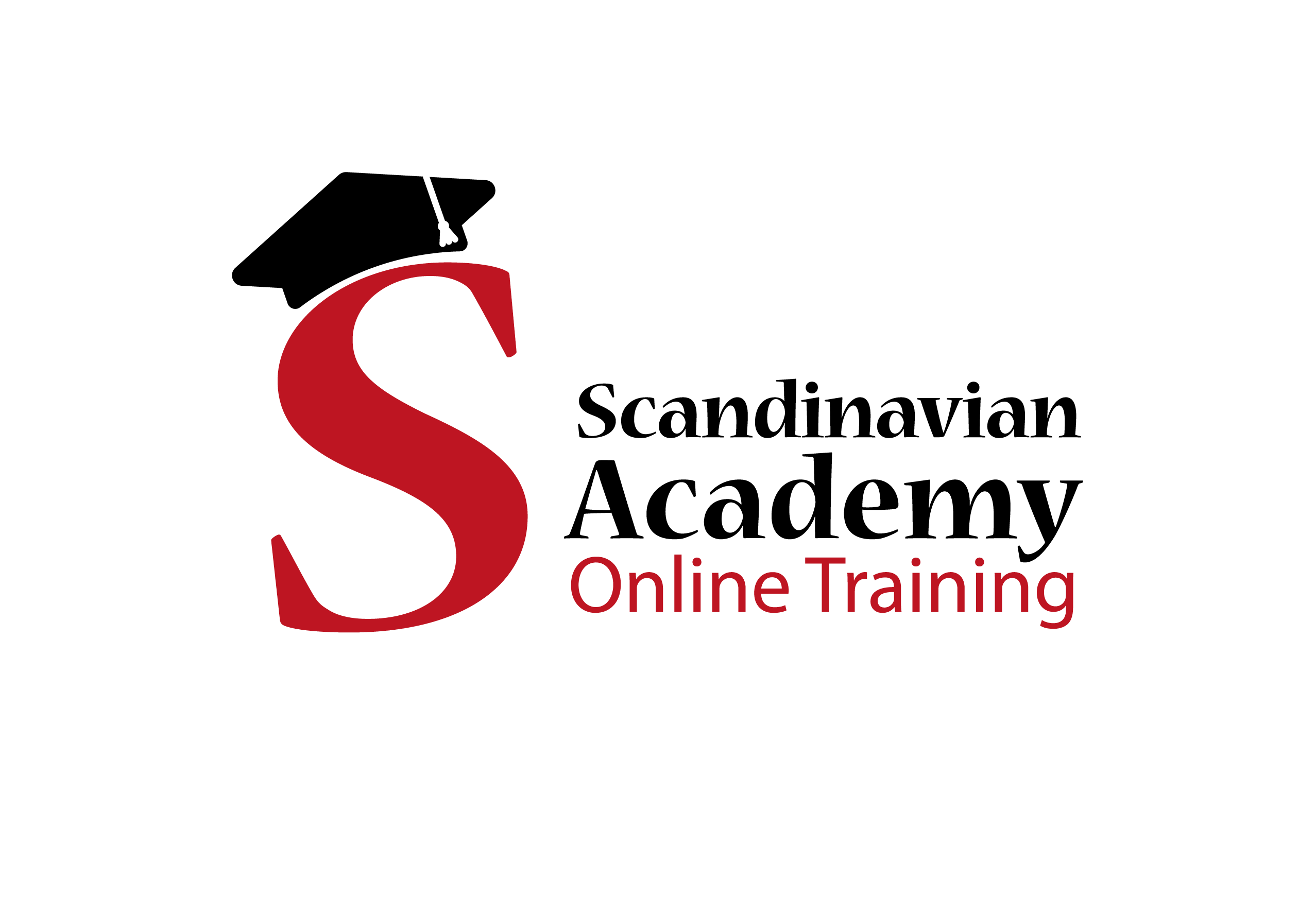The Scandinavian Academy for Training and Development adopts the latest scientific and professional methodologies in training and human resource development, aiming to enhance the efficiency of individuals and organizations. Training programs are delivered through a comprehensive approach that includes:
- Theoretical lectures supported by PowerPoint presentations and visual materials (videos and short films).
- Scientific evaluation of participants before and after the program to measure progress and knowledge acquisition.
- Brainstorming sessions and practical role-playing to simulate real-life scenarios.
- Case studies tailored to align with the training content and participants work nature.
- Assessment tests conducted at the end of the program to evaluate the achievement of training objectives.
Each participant receives the training material (both theoretical and practical) in printed form and saved on a CD or flash drive. Detailed reports, including attendance records, final results, and overall program evaluations, are also provided.
Training materials are prepared professionally by a team of experts and specialists in various fields. At the end of the program, participants are awarded a professional attendance certificate, signed and accredited by the Scandinavian Academy for Training and Development.
Program Timings:
- 9:00 AM to 2:00 PM in Arab cities.
- 10:00 AM to 3:00 PM in European and Asian cities.
The program includes:
- A daily buffet provided during the sessions to ensure participants comfort.
The Course
One of the most important phases in the success of project development is the planning phase. That’s why the management of a project begins at this critical phase where exceptionally realistic time and cost estimates are most needed to help the project manager realize the project’s deliverables. Good project planning not only saves time and money, but also increases the overall earned project value (quality, reliability, safety, etc.) for the amount of funding expended.
This course is comprised of three modules which can be booked as a training event, or as individual courses; Module 1 presents and examines the principles, tools and techniques used to develop schedules for both time and resources; Module 2 covers basic and advanced cost estimation techniques as well as the impact of risks that need to be considered to ensure the plan predicted is valid; and Module 3 Module presents and examines the implementation of the Value Engineering (VE) concept for maximizing project functionality, reliability and quality at the lowest possible cost.
The Structure
Module 1 - Project Scheduling & Contingency Planning Skills
Module 2 - Project Cost Estimating Skills
Module 3 - Value Engineering Skills
The Goals
Following the completion of this course, delegates will:
- Gain knowledge of techniques used in project estimating, from the conceptual stage to the final detailed estimate
- Understand the different types of estimates used to accurately and progressively estimate project costs
- Understand the different types of contracts based on the distribution of risk between contracting parties
- Gain knowledge of techniques used in resource planning and control
- Understand the time-cost trade-offs
- Identify risk sources and minimize their impact and learn how to sustain project momentum
- Learn how to administer project documentation and reporting
- Develop effective performance monitoring and control system
- Effectively apply incentive arrangements to get the best results from the contract
- Gather and organize information and cost relevant to the design aspects of the project
- Demonstrate better understanding of the key functions performed by key components of the design
- Critically assess and evaluate the relationships among key attributes such as cost, value and function
- Report effectively to top management and project stakeholders in the context of proposing new design alternatives that improve the overall project value
- Demonstrate proficiency in applying life-cycle costing principles
- Objectively present a convincing case in support of certain design alternatives
The Process
The course is a mixture of speaker input, case studies and practice exercises which will be used to facilitate group discussion. Delegates will gain detailed knowledge of cost estimation and value engineering concepts and techniques by active participation in the exercise/training sessions. Through lectures, case studies and practical exercises, delegates will focus on key concepts, terms, and principles necessary for realistically estimating, controlling and optimizing project costs.
The Benefits
This course will provide delegates with a proven set of critical skills and techniques for the development a systematic and dynamic project schedule, reliable cost estimate, as well as the ability and skills to compare the costs of alternative strategies or technical approaches to ensure the most economical project at the desired level of quality.
The Results
Individuals and organisations will be better prepared in relation to how to manage the schedule, cost and design of their projects according to best practices. Individuals will learn how to adopt and apply a structured approach to time and cost estimation, budgeting and value engineering. This in turn will lead to having a consistent and streamlined schedule, cost and design management processes across the organisation.
The Core Competencies
Delegates attending this course will enhance their competencies in the following areas:
- Ability to deliver projects on time and within budget
- Understanding of what it takes to be a successful project manager
- Skill and confidence to plan and control projects successfully and ability to sidestep the most common project management pitfalls and problems
- Appreciation of the philosophy, framework, standards and approaches to the delivery of the projects
- Developing an initial project budget for the owner
- Determining project feasibility
- Designing the project within the owner`s budget
- Evaluating alternative design concepts and project components
- Preparing bids & cost proposals
- Establishing project budgets
- Determining the cost impacts of change orders
- Developing appreciation of how to frame decisions and to develop decision hierarchies
- Bringing Value Engineering into the organization’s business planning process
- Identifying major roadblocks to creativity, and ways to mitigate them
- Evaluating the results of a brainstorming session to develop the best value-adding scenario
- Adhering to a structures sequence of logical steps to solve problems that eliminate unnecessary costs without compromising quality or functionality
The Scandinavian Academy for Training and Development is committed to hosting all training programs in dedicated and well-equipped hotel facilities specifically designed for conducting and delivering training sessions, unless explicitly stated otherwise on our website. Participants will be notified of the program venue within 7 to 21 days prior to the programs start date, based on the Academys assessment and the programs circumstances. The Scandinavian Academy for Training and Development emphasizes that it holds no responsibility for any force majeure events that may prevent the program from being held at the designated venue. Nevertheless, the Scandinavian Academy for Training and Development will make every effort to provide suitable alternatives and extend the necessary support to participants in the event of a venue change due to unforeseen circumstances.

 DUBAI (UAE)
DUBAI (UAE)
 Kuala Lumpur (Malaysia)
Kuala Lumpur (Malaysia)
 Amman (Jordan)
Amman (Jordan)
 Jakarta (Indonesia)
Jakarta (Indonesia)
 Sharm ElShaikh (Egypt)
Sharm ElShaikh (Egypt)
 Amsterdam (Netherlands)
Amsterdam (Netherlands)
 Casablanca (Morocco)
Casablanca (Morocco)
 Paris (France)
Paris (France)
 Istanbul (Turkey)
Istanbul (Turkey)
 Singapore (Singapore)
Singapore (Singapore)
 Manama (Bahrain)
Manama (Bahrain)
 Washington (US)
Washington (US)
 Beirut (Lebanon)
Beirut (Lebanon)
 Barcelona (Spain)
Barcelona (Spain)
 Kuwait (Kuwait)
Kuwait (Kuwait)
 Budapest (Hungary)
Budapest (Hungary)
 Athens (Greece)
Athens (Greece)
 Copenhagen (Denmark)
Copenhagen (Denmark)
 Berlin (Germany)
Berlin (Germany)
 Brussels (Belgium)
Brussels (Belgium)
 Bucharest (Romania)
Bucharest (Romania)
 Zurich (Switzerland)
Zurich (Switzerland)
 Hamburg (Germany)
Hamburg (Germany)
 Marrakesh (Morocco)
Marrakesh (Morocco)
 Beijing (China)
Beijing (China)
 Doha (Qatar)
Doha (Qatar)
 Bangkok (Thailand)
Bangkok (Thailand)
 Muscat (Oman)
Muscat (Oman)
 Toronto (Canada)
Toronto (Canada)
 Cyprus (Larnaka)
Cyprus (Larnaka)
 Cairo (Egypt)
Cairo (Egypt)
 Madrid (Spain)
Madrid (Spain)
 London (UK)
London (UK)
 Stockholm (Sweden)
Stockholm (Sweden)
 Geneva (Switzerland)
Geneva (Switzerland)
 Vienna (Austria)
Vienna (Austria)
 Munich (Germany)
Munich (Germany)
 Prague (Czech Republic)
Prague (Czech Republic)
 Rome (Italy)
Rome (Italy)
 Hong Kong
Hong Kong
 Dublin (Ireland)
Dublin (Ireland)
 Auckland (New Zealand)
Auckland (New Zealand)
 Trabzon (Turkey)
Trabzon (Turkey)
 Florence (Italy)
Florence (Italy)
 Tunisia
Tunisia
 Marbella (Spain)
Marbella (Spain)
 New York (US)
New York (US)
 Tbilisi (Georgia)
Tbilisi (Georgia)
 Frankfurt (Germany)
Frankfurt (Germany)
 Malaga (Spain)
Malaga (Spain)
 Yerevan (Armenia)
Yerevan (Armenia)
 Baku (Azerbaijan)
Baku (Azerbaijan)
 Zagreb (Croatia)
Zagreb (Croatia)
 ONLINE
ONLINE
 Hurghada (Egypt)
Hurghada (Egypt)
 Warsaw (Poland)
Warsaw (Poland)
 Milan (Italy)
Milan (Italy)
 Chicago (US)
Chicago (US)
 Los Angeles (US)
Los Angeles (US)









 10 Jan
10 Jan
 Cairo (Egypt)
Cairo (Egypt)













 46700414979
46700414979